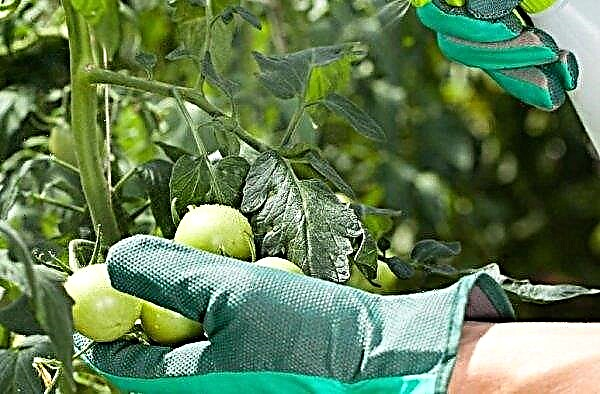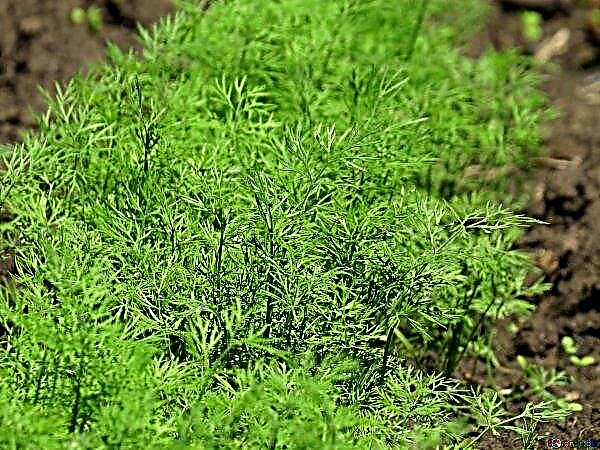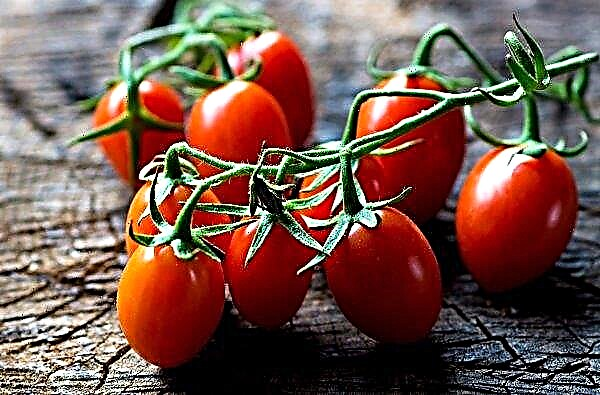With various disorders of the digestive system, doctors usually recommend sharply limiting the diet and getting rid of excessively aggressive foods for the gastrointestinal tract. Most often, the ban remains fatty and spicy foods, but sometimes the ban applies to fresh fruits. From this article you will find out whether it is possible to use watermelon with high acidity of the stomach, as well as how this product affects the body in acute and chronic gastritis.
Can I eat watermelon with gastritis
Gastritis and other digestive ailments today are among the most common pathologies that modern mankind is faced with. A strict diet often helps to alleviate the course of such diseases, but you must take into account the rules for eating seasonal foods, which include watermelon.
Did you know? Watermelon belongs to the oldest fruit plants, it was actively used and cultivated by the ancient Egyptians 5 thousand years ago.
Today, the issue of fetal safety for the body with digestive pathologies remains open, as it affects the weakened stomach ambiguously. On the one hand, the product saturates the body with all kinds of vitamins and rare minerals, and also contributes to the intensification of the excretory system. This is especially important for a variety of problems with the digestion of food, including stomach ulcers. On the other hand, it can cause digestive irritation; it contains ascorbic acid and other compounds that in large quantities can worsen the condition of damaged gastrointestinal tissues.

As a rule, the fetus is not forbidden to use during the period of remission, the alleviation of the symptoms of the disease - at this time, watermelon juice is not able to damage the stomach and other digestive departments, however, it should be consumed in small portions and only in moderation. During an exacerbation of ailments or during heartburn, watermelon is strictly prohibited, with the exception of gastritis with low acidity. However, at the same time, it is recommended to consume no more than a few slices of the fetus per day.
In addition to watermelon, with hyperacid erosive gastritis, you should not use any other berries with high acidity. The exception is raspberries, lingonberries, dates, viburnum, cranberries, cherries, plums, strawberries and cherries. At the same time they are consumed in small portions, not more than 1 time per day and only during the period of remission.
With gastritis with low acidity during the period of exacerbation, any berries with small seeds (raspberries, strawberries, etc.) are absolutely forbidden, while they are allowed with prolonged remission, but only in a small amount, otherwise the stomach will be very sore.Important! In order not to harm digestion, berries and other fruits must be completely ripe and sweet. Only this is the main rule for the safe use of such products.
The chemical composition of watermelon
Watermelon is considered quite concentrated and rich in all kinds of substances fruit; in addition, it is a low-calorie product, since 100 g of pulp contains no more than 30 kcal.

The main health value is a complex of vitamins most important for humans, among them the following are distinguished by the highest concentration:
- AND;
- WITH;
- Group B;
- E;
- PP;
- beta-carotene (a precursor of vitamin A).
Among macro-and micronutrients are found:
- calcium;
- magnesium;
- potassium;
- phosphorus;
- sodium;
- iron.
Nutritional value of the fetus (table):
| Substance | Amount per 100 g |
| Squirrels | 0.6 g |
| Fats | 0.1 g |
| Carbohydrates | 5.8 g |
| Saccharides | 5-6 g |
| Alimentary fiber | 0.4 g |
| Organic acids | 0.1 g |
| Ash | 0.5 g |
| Water | 92.5 g |
The main feature of the berry is the composition of pulp sugars. Instead of the usual glucose for many fruits, the watermelon stores in the pulp a more useful and simple fructose. This substance is more acceptable for the body than other sugars, and is also absorbed much more actively, with minimal irritating effect on inflamed tissues.
The properties of watermelon for the human body
Today, there are many diets based on the use of watermelon, but not every such diet can positively affect the body. That is why, before introducing the fetus into the diet, it is necessary to find out both its negative and positive sides. Especially acute is the case with digestive diseases, since it is not easy to treat an inflamed gastrointestinal tract in case of malnutrition.

Benefit
- With moderate use, even with gastritis, the introduction of watermelon into the diet helps:
- remove toxins and toxins from organs and tissues;
- strengthen immunity;
- improve the condition of the kidneys and urinary tract;
- stabilize blood sugar levels;
- make up for the deficiency of vitamins and minerals in the body;
- increase metabolism;
- activate the cardiovascular system;
- restore skin condition and protect the skin from aging;
- cope with erectile dysfunction;
- reduce excess weight.
Did you know? In nature, there are watermelons with square fruits, bred in Japan back in 1981. Square watermelons have low taste, but are actively used as the best decoration of traditional Japanese holiday tables.
Harm and contraindications
With moderate use, watermelon is completely safe for human health.
- However, with excessive use, it can cause:
- allergic manifestations (rash, itching, etc.);
- deterioration of the kidneys and excretory channels;
- intoxication of the body;
- digestive disorders.

To avoid negative effects on the body, the product is prohibited in case of:
- exacerbation of chronic and acute digestive diseases;
- a combination of several gastrointestinal pathologies, both in the acute phase and in remission;
- calculi in the kidneys or the pathways (can cause the movement of stones);
- acute digestive upset, especially if accompanied by nausea and diarrhea.
Norms and basic rules for the use of watermelon for gastritis
As mentioned above, during digestive pathologies, watermelon is allowed to be consumed only during a period of prolonged remission of the disease. However, if a combination of several digestive disorders is observed, including with pancreatitis, the product is not allowed for inclusion in the diet.
In other cases, the permitted daily allowance of the fetus should not exceed 500 g. At the same time, only the sweetest pulp from the center of the fetus is suitable for use - the layers adjacent to the crust are often full of nitrates and their derivatives that are harmful to the body, which, with problems with the gastrointestinal tract, can cause additional burdening of the body .
How to choose a good watermelon
The main condition for the safety of fruits and vegetables is the choice of only quality copies.  To buy the right watermelon and not cause harm to your health with gastritis, as well as stomach acid syndrome, when choosing a fetus, you should pay attention to the following features:
To buy the right watermelon and not cause harm to your health with gastritis, as well as stomach acid syndrome, when choosing a fetus, you should pay attention to the following features:
- the highest quality berries are sold from mid-August to mid-September; at other times, they are often sold unripe, with a high content of all kinds of chemicals;
- a ripe fetus, when pressed, should make a loud crack - if it is not observed, the product is most likely unripe or has been subjected to artificial ripening methods;
- a slice of pulp should not stain water in a pink or reddish tint, otherwise there is a glut of the pulp with nitrates and other toxins;
- on the cut, the pulp should have almost imperceptible veins and inclusions of sugar grains; if the veins have a pale or yellowish tint - the watermelon has been repeatedly exposed to a variety of chemicals and can be a source of toxins.
Important! Slices or halves of the fetus can be stored for up to 2 days, but for this they must be wrapped in cling film and transferred to the refrigerator.
Storage Features
Despite the fact that watermelon is a perishable product, this fruit is suitable for successful storage for a long time. In general, depending on the variety and maturity, it can last up to 3 months. Most often, whole fruits are stored in the refrigerator, at a temperature of 0 ... + 5 ° С - in such conditions, the best microclimate is created in order to provide the fruits with a long shelf life. It is best to replace the refrigerator with a vegetable store or a cellar.

Often fragrant fruits are stored for future use, so sometimes in the refrigerator or other place for them sometimes there is no free space. In this case, they can be left to be stored even at room temperature. At room temperature, the watermelon can lie up to 4-5 weeks, however, for this, the fruits should be protected from sunlight.
To ensure high-quality and long-term storage, it is necessary:
- acquire only late ripe and thick-bred varieties;
- pay attention to the integrity of the watermelon integument - cracks and cuts dramatically reduce its durability;
- dwell on small fruits weighing up to 6 kg - they have the most convenient dimensions for long-term bookmarks, both in the refrigerator and in a special storage;
- protect watermelons from excessive humidity, the storage area should be periodically ventilated.
Watermelon is a valuable product for the diet, which is able to compensate for the deficiency of the body with a variety of necessary substances, as well as improve the condition of the body with many ailments. However, in the case of digestive pathologies, it should be used sparingly and with caution, especially during an exacerbation. It is also important to know how to choose and store it correctly.












